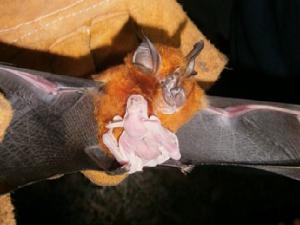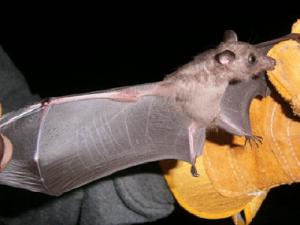Edem Kodzo Ekpe
Other projects
26 Jun 2006
Participatory Assessment of Crop-Raiding by Wildlife in the Afadjato-Agumatsa Conservation Area to Conserve Nature
27 Aug 2009
Using Local Strategies for Addressing Crop-Raiding by Wildlife in the Afadjato-Agumatsa Conservation Area
This project seeks to reduce threats to the straw-coloured fruit bat by mapping active roosting sites and establishing a pilot network of local conservation volunteer groups in Ghana.

A baby bat clings to its mother.
The straw-coloured fruit bat, Eidolon helvum is increasingly threatened by hunting and habitat degradation in Ghana. Globally, its conservation status is rapidly declining; and it is close to qualifying as a Vulnerable species on the IUCN Red Data List. The bats are migratory and exhibit roosting site fidelity. Their effective conservation therefore requires coordinating actions at the different roosting sites. Though local communities are very effective for long-term nature conservation, their efforts to conserve the species and their habitats are very few and uncoordinated. This project seeks to reduce threats to the species and its habitats by mapping active roosting sites and establishing a pilot network of local conservation volunteer groups at selected roosting sites throughout Ghana. These volunteers will use the conservation of the species and their habitats as a flagship activity.

A nectar eating bat (note the pointed muzzle).
Documentation and establishment of a database on the species and their habitats as well as the networking of conservation groups will help to bring more conservation action to the aid of the species. The habitats of Eidolon helvum are largely forests and wooded savanna areas which are also rapidly declining in size in Ghana. These habitats also support biodiversity including a number of other mammals, birds, reptiles, amphibians, and fish in water bodies. These habitats are important for protecting watersheds. The protection of the bats will therefore contribute to conservation of other biodiversity and their habitats. Local communities will be engaged in conservation through capacity building. Volunteers will be trained in conservation education and bat ecology. The main livelihood activity in many rural areas is crop-farming. Therefore, lessons learned from my 1st and 2nd RSGs in using local strategies to reduce crop-raiding by wildlife will be promoted in other areas. The network of local conservation groups will promote citizens conservation action by bringing people from different parts of the country together.
This will be the first active network of local people involved in conservation in Ghana. The bat species will be used as flagship species for conservation education in the local communities. The species have a widely known roost in the capital Accra, which will be used to give the project a national dimension through media interactions.